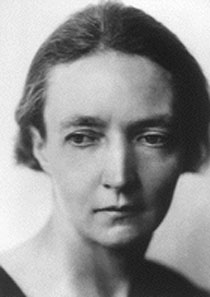| Irène Joliot-Curie  AKA Irène Curie AKA Irène Curie
Born: 12-Sep-1897
Birthplace: Paris, France
Died: 17-Mar-1956
Location of death: Paris, France
Cause of death: Cancer - Leukemia
Remains: Buried, Sceaux Cemetery, Hauts-de-Seine, France
Gender: Female
Religion: Atheist
Race or Ethnicity: White
Sexual orientation: Straight
Occupation: Physicist, Chemist Nationality: France
Executive summary: Artificial radioactivity French physicist Irène Joliot-Curie had little formal schooling as a young child, but what teachers she had for home schooling — her mother, two-time Nobel laureate Marie Curie, and father, Nobel winner Pierre Curie, with chemistry lessons taught by family friend Jean Perrin and mathematics taught by her mother's paramour Paul Langevin. She later attended Collège Sévigné for the equivalent of high school, but her college education at the Sorbonne was interrupted by the advent of World War I.
She was several years older than Frédéric Joliot, and when he came to work at the family's Curie Institute she was at first put off by his unfamiliarity with the laboratory's equipment, but they soon fell in love and married. They worked together frequently and co-authored much of their research, most notably their 1934 production of synthesized radioactive elements, transforming boron into radioactive nitrogen, magnesium into silicon, and building radioactive isotopes of phosphorus from aluminum. For this they shared the 1935 Nobel Prize for Chemistry. They also discovered in 1932 that beryllium emits radiation when bombarded with alpha rays.
Despite her Nobel Prize and accomplished resume, she was rejected for membership in the American Chemical Society and numerous other prestigious groups, due to her gender and politics. Like her mother, she died of leukemia brought on by a lifetime of work with radioactive elements, including a 1946 lab accident in which a sealed capsule of polonium exploded in front of her, causing extensive radioactive scalding. In her obituary in the scientific journal Nature, Sir James Chadwick wrote, "She knew her mind and spoke it, sometimes perhaps with devastating frankness; but her remarks were informed with such regard for scientific truth and with such conspicuous sincerity that they commanded the greatest respect in all circumstances. In all her work, whether in the laboratory, in discussion, or in committee, she set herself the highest standards and she was most conscientious in the fulfillment of any duties she undertook."
Joliot-Curie and her husband were active in the French underground during World War II, and she was an advocate for peace, socialism, and equal rights for women. She served briefly as Undersecretary of State for Scientific Research in the administration of French Prime Minister Léon Blum. Her daughter Hélène Joliot-Curie married Michel Langevin, whose grandfather Paul had been among Irène Joliot-Curie's childhood teachers. Her sister Ève Curie wrote Madame Curie, the best-known biography of Curie's mother, and married Henry Labouisse (1904-1987), who was the Director of the United Nations Children's Fund (UNICEF) for fifteen years. In addition to the five Nobel Prizes won in Curie's immediate family, Labouisse accepted a sixth when UNICEF won the Nobel Peace Prize in 1965. Father: Pierre Curie (chemist)
Mother: Marie Curie (chemist)
Sister: Ève Denise Curie Labouisse
Husband: Frédéric Joliot (chemist, m. 9-Oct-1926)
Daughter: Hélène Joliot-Curie Langevin-Joliot (nuclear physicist, b. 19-Sep-1927)
Son: Pierre Joliot-Curie (biologist, b. 12-Mar-1932)
High School: Collège Sévigné, Paris, France (1914)
University: Sorbonne (attended 1914-16)
University: DSc Physics, Institut du Radium, University of Paris (1925)
Professor: Physics, Sorbonne (1937-56)
Scholar: Curie Institute of Paris (1921-46)
Administrator: Curie Institute of Paris (1946-56)
Nobel Prize for Chemistry 1935 (with Frédéric Joliot)
Matteucci Medal 1932 (with Frédéric Joliot)
French Atomic Energy Commission Co-Founder, 1946-51
National Committee of the Union of French Women
French Legion of Honor Officer, 1939
French Official Undersecretary of State for Scientific Research, 1936-37
Radiation Mishap Polonium explosion (1946)
Risk Factors: Tuberculosis
Author of books:
Artificial Production of A New Kind of Radio-Element (1934, non-fiction; with Frédéric Joliot)
Complete Scientific Works (1961, non-fiction; with Frédéric Joliot; posthumous)
Requires Flash 7+ and Javascript.
Do you know something we don't?
Submit a correction or make a comment about this profile
Copyright ©2019 Soylent Communications
|